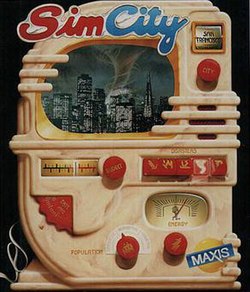SimCity (1989 video game)
| SimCity | |
|---|---|

Some cover art for SimCity features a jukebox-like design, with different versions depicting different cities and disasters.
|
|
| Developer(s) |
Maxis Infogrames (Amiga CDTV version) Nintendo EAD (SNES version) Mobile: Babaroga |
| Publisher(s) | Brøderbund, Maxis, Nintendo, Electronic Arts, Superior Software/Acornsoft and Infogrames Entertainment, SA (first European release) |
| Designer(s) | Will Wright |
| Composer(s) |
Frédéric Mentzen Philippe Vachey (Amiga CDTV) Soyo Oka (SNES) |
| Series | SimCity |
| Platform(s) | Acorn Archimedes, Acorn Electron, Amiga, Amiga CDTV, Amstrad CPC, Atari ST, BBC Micro, C64, DESQview, DOS, EPOC32, FM Towns, iOS (iPod Touch, iPhone and iPad), PC-98, GBA, OLPC XO-1, OS/2, Linux, Mac OS, Mobile phone (Symbian or Java), NeWS, Web browser, Sharp X68000, Super NES, Tk, Unix, Windows, X11 TCL, Sinclair ZX Spectrum, Wii (via Virtual Console) |
| Release date(s) | February, 1989 |
| Genre(s) | City-building game |
| Mode(s) |
Single-player Multi-player (some editions) |
SimCity, later renamed SimCity Classic, is a city-building simulation video game, first released on February 2, 1989, and designed by Will Wright for the Macintosh computer. SimCity was Maxis's second product, which has since been ported into various personal computers and game consoles, and spawned several sequels including SimCity 2000 in 1993, SimCity 3000 in 1999, SimCity 4 in 2003, SimCity DS, SimCity Societies in 2007, and SimCity in 2013. Until the release of The Sims in 2000, the SimCity series was the best-selling line of computer games made by Maxis. SimCity spawned a series of Sim games.
On January 10, 2008 the SimCity source code was released under the free software GPL 3 license under the original working title- Micropolis.
SimCity was developed by game designer Will Wright. While working on the game Raid on Bungeling Bay, in which the player flies a helicopter dropping bombs on islands, Wright found he enjoyed designing the islands in the level editor more than playing the actual game. This led him to develop increasingly sophisticated level editors. At the same time, Wright was cultivating a love of the intricacies and theories of urban planning and acknowledges the influence of System Dynamics which was developed by Jay Wright Forrester and whose book on the subject laid the foundations for what would become SimCity. In addition, Wright also was inspired by reading "The Seventh Sally", a short story from The Cyberiad by Stanisław Lem, in which an engineer encounters a deposed tyrant, and creates a miniature city with artificial citizens for the tyrant to oppress. The game reflected Wright's approval of mass transit and disapproval of nuclear power; Maxis president Jeff Braun stated "We're pushing political agendas".
...
Wikipedia
